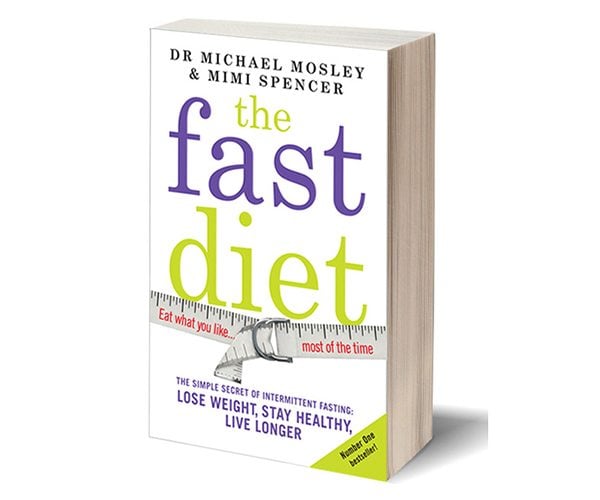Can intermittent fasting really be good for you?
Fasting diets have never been so fashionable. There are bestselling cookbooks on the subject, restaurants offering fast-day menus, and, of course, celebrity fasters.
But is intermittent fasting actually effective for slimming or just another fad? Sue Quinn tackles a weighty subject.

Fasting for religious or spiritual reasons dates back thousands of years, but skipping meals to shift pounds flies in the face of the advice doctors have given us for years that going hungry is not a sensible route to long-term weight loss. These days, however, growing numbers of people are claiming weight-loss success by alternating short bouts of eating very little with periods of eating normally, known as intermittent fasting (IF). It’s an eating pattern praised by celebrities such as Hugh Jackman and Benedict Cumberbatch – and it appears to be winning some scientific favour, too.

Many variants have grown out of the core idea of intermittently restricting calorie intake. The 5:2 diet, the subject of the bestselling book The Fast Diet by broadcaster Michael Mosley (he trained as a doctor), involves five days of eating normally and two days consuming fewer than 500 calories for women and 600 for men. The 4:3 or ‘every other day’ diet is similar, with fasting done on alternate days each week, omitting breakfast on fast days. The 16:8 diet is another version that involves fasting for 16 hours – from 8pm until noon the next day, for example – with two healthy meals eaten after that.
Advocates of IF claim this pattern of eating has many advantages. They argue it’s easy to comply with a regime that doesn’t require deprivation every day; the prospect of eating something enjoyable on the near horizon helps you through the hunger. Some scientists also believe that IF might affect our metabolism and make our bodies more inclined to burn fat.
How does it work?
Dr Alex Johnstone, an obesity and metabolic health specialist at Aberdeen University, believes intermittent fasting diets are simply a way of reducing calorie intake. “My own research suggests that on ‘feast days’, people don’t fully compensate for the energy deficit,” Dr Johnstone says. “It works because, over time, people don’t consume enough calories to meet the body’s energy requirements.” She points to a 2014 study by the University of South Australia, which found no difference in weight loss after 12 months between overweight participants who followed eight weeks of consistent dieting and those who followed an IF diet (one week on, one week off) for 8 weeks. “It seems to work for some people,” Dr Johnstone concedes. But she adds: “I would argue that people still feel hungry and that makes it difficult to stick to.”
Other experts believe the benefits of IF diets are more complex. Consultant nutritionist Dr Rafe Bundy says fasting causes insulin levels to drop, which allows the body to switch to burning more fat. “When you eat carbohydrates, your insulin level goes up to compensate, which also tells the body to store fat,” he explains. “So, if you keep eating, especially foods containing refined carbohydrate such as sugar, your body will keep burning the carbohydrates and keep storing the fat.” When you fast, however, insulin levels fall for longer. “This means there’s a metabolic shift to burn fat.”

What happens to our bodies?
There are other potential benefits to IF, too. Dr Bundy says our bodies go into a kind of ‘rest and repair’ mode during fasting. “Not having to digest food allows the body to do some ‘housework’, and has been associated with improved markers of health,” he says. Research suggests potential health benefits include improved cell function, decreased inflammation (associated with many chronic diseases), improved insulin resistance (which helps keep blood sugar levels stable) and reduced risk of certain obesity-related cancers (such as breast cancer).
Dr Bundy points to research into ‘every other day’ fasting by Dr Krista Varady at the University of Illinois at Chicago. Dr Varady found that patients who consumed 25 per cent of their normal calorie intake on alternate days lost on average 5-6kg over eight weeks, and decreased their risk of coronary artery disease in the process. “I think IF can be a very good strategy for otherwise healthy people, and there are plenty of other health benefits aside from weight loss,” Dr Bundy says.
Are there any downsides?
People are advised to approach IF diets with care. Prolonged fasts can be dangerous and cause the body to burn off muscle tissue instead of fat. Conversely, some people overindulge on non-fast days; the University of South Australia study referred to earlier found that those who dieted consistently tended to eat more healthily overall than those on an IF diet. The NHS also warns that skipping meals can have side effects such as dizziness, irritability, headaches, difficulty sleeping, drowsiness, bad breath and dehydration.
And what about long term? What do you do when you reach your correct weight? If you continue dieting, you may be harming your body. But if you go back to eating as you did before IF, it’s more than likely you’ll put the weight back on. Michael Mosley overcame this by sticking to his 5:2 diet (his book is a personal account of his experience) but he increased his energy intake to a more manageable 1,000 calories on fast days.
What’s the bottom line?
For those who are overweight, the health benefits of losing weight can’t be overstated, and some people may find sticking to a diet for two days a week or every other day is more achievable than following a calorie-reduced diet every day. Such intermittent fasting could have a range of added health benefits too. However, long-term research using larger numbers of humans is needed to prove its effectiveness, to identify which version of the diet is best and to determine what the long-term side effects will be.
Subscribe to our magazine
Food stories, skills and tested recipes, straight to your door... Enjoy 5 issues for just £5 with our special introductory offer.
Subscribe
Unleash your inner chef
Looking for inspiration? Receive the latest recipes with our newsletter


